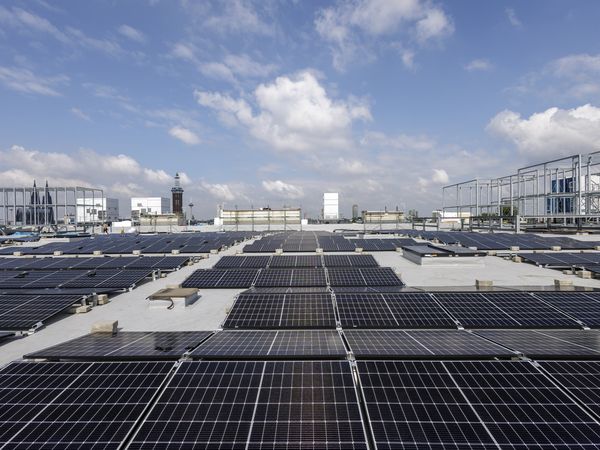4,800 modules with an output of almost 2.0 megawatt peak (MWp) ensure annual CO2 savings of 1,200 tonnes.
With the construction of the largest inner-city photovoltaic system in Cologne, Koelnmesse is one step closer to its goal of climate-neutral business operations by 2035. In the coming weeks, the roofs of Hall 11 and the
around 4,800 photovoltaic modules will be installed on the roofs of Hall 11 and the south entrance,
which promise an annual yield of 2 million kilowatt hours. "Photovoltaics play a key role on our path towards a future-oriented energy supply," emphasises Gerald Böse, CEO of Koelnmesse GmbH. "The self-generated energy enables us to reduce our CO2 footprint by around 1,200 tonnes per year."
"Large-scale projects such as Koelnmesse's photovoltaic system make an important contribution to the City of Cologne's ambitious goal of being CO2-neutral by 2035. Koelnmesse is also acting as a role model for other companies to position themselves sustainably," says Lord Mayor Henriette Reker.
The system on the roof of Hall 11 and the south entrance covers a usable area of around 15,000 square metres. It will generate around 2 gigawatt hours (GWh) of green electricity per year. Together with the photovoltaic system already installed on the roof of the new Confex building, this corresponds to the consumption of well over 1,000 two-person households. The electricity generated will be used directly at the Koelnmesse exhibition centre. The way in which other roofs of the exhibition halls will be used for photovoltaic systems is currently being planned on the basis of a comprehensive potential analysis.
"Overall, this project to generate electricity from renewable energy sources is part of Koelnmesse's sustainability strategy and follows on from our existing initiatives, such as the purchase of green electricity and energy optimisation measures, for example by switching to LEDs and optimising our cooling and heating systems," says Horst Harbusch-Geier, Head of Infrastructure at Koelnmesse.
In order to gradually come closer to meeting its own requirements for climate-neutral and sustainable business operations, Koelnmesse has implemented or worked on various projects and topics in recent years. These include the dynamic logistics management system eSlot, the world's largest trade fair traffic guidance system to reduce traffic jams and vehicle emissions and the complete switch to green electricity. Another important goal is to reduce energy consumption. A gradual switch to LED lighting in the exhibition halls is currently underway, which will enable energy savings of at least 50 per cent compared to the old technology. Replacing the ventilation systems will also lead to energy savings of over 50 per cent. In addition, Koelnmesse optimises the use of the ventilation systems based on hall occupancy and usage times and adjusts the interior temperatures of the halls to further support these efforts.
Koelnmesse also promotes alternative mobility with a job ticket and bike leasing for its employees as well as the expansion of e-charging stations at the exhibition centre; the trade fair ticket has also been a public transport ticket for decades. Koelnmesse is also working with numerous partners to conserve resources during events and raise awareness of increased sustainability. The focus is currently on stand construction, catering and general services: For example, Koelnmesse is the only trade fair company in Germany to date to offer a restaurant that is permanently 100 per cent vegan. Sustainable system stands, which are an ideal basis for sustainable trade fair construction thanks to their long-term reuse, also help exhibitors to realise their own sustainability goals.
The measures listed are just some of the building blocks of Koelnmesse's comprehensive sustainability strategy. This strategy is currently being finalised and covers a number of other important aspects. These include efficient waste and recycling management, sustainable procurement and responsible supply chain management.
